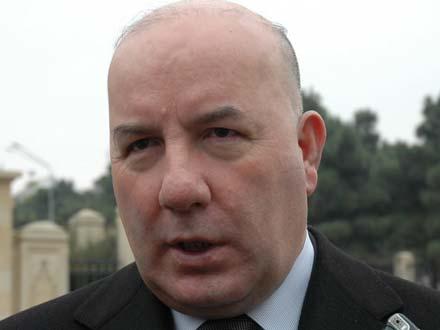Azerbaijan may use new monetary policy due to declining oil prices

By Gulgiz Dadashova
Amid the resistance of some OPEC members to decrease oil production and the U.S. shale boom, oil prices slumped almost 50 percent in 2014, the highest decline since the 2008 financial crisis. People are now speculating about further crises with predicting oil prices’ decline to $20.
The fall in the world’s oil prices have also weakened the Russian ruble. This has negatively affected the economy of the former Soviet Unions.
Azerbaijan, the largest economy in the South Caucasus is now working hard to further keep the stability of the national currency and avoid price hikes.
Speaking at the latest Cabinet meeting, President of the Central Bank of Azerbaijan Elman Rustamov said the CBA is seeking to resort to the quantitative measures to support economic growth and prevent the negative effects of the fall on oil prices in 2015.
QE is an unconventional monetary policy in which a central bank purchases government securities or other securities from the market with a view to lower interest rates and increase the money supply. This allows increasing the money supply by flooding financial institutions with capital in an effort to promote increased lending and liquidity. QE is considered when short-term interest rates are at or approaching zero, and does not require printing of new banknotes.
The more reserves a bank has, the more it is willing to issue loans. The easier way for a company is to get a loan to invest more in its development. The more active a company is, the more it hires.
Rustamov said the inflation in the country was at the level of 1.4 percent. Noting that the CBA keeps an eye on the risk of deflation (decline in consumer prices, negative inflation), Rustamov said: "Our goal is rather to prevent a possible transition to deflation than to fight inflation.”
The low level of inflation (in the range of 2-3 per cent) is a lesser evil than the decline in prices. That is why, the central bank, seeing that inflation in the country stands at just 1.4 percent, in advance prepares for potentially possible complications in the future.
In case the CBA applies QE, the bank will direct a huge amount of cheap money to banks. If the Central Bank becomes the main buyer-they, the banks will naturally direct the money to lending: the real sector and thus the pace of economic growth will increase.
In addition, QE may also be a positive effect on the rate of the
loan – the cheaper banks attract their money, the cheaper will be
loans that will be issued from this money.
The problem of high interest rates was raised regularly in the
Parliament. The CBA has lowered the discount rate (twice last
year), now it is 3.5 percent. Of course, there is an ample
opportunity for its further decline, but the monetary expansion
will give an alternative tool to influence the regulator.
Overall, the QE can have a stimulating effect on the national economy. Of course, there are certain risks associated with rising inflation and possible exchange rate fluctuations, but the CBA, firstly, have sufficient experience in ensuring the stability of the manat, and, secondly, as noted by itself Elman Rustamov, there is the experience of the United States (with their three programs of QE), Japan and the EU - which is sure to be studied.
Also, Azerbaijan has sufficient foreign exchange reserves, low external debt and a stable currency. All this, as well as confident and timely prevention will make Azerbaijan resistant to any economic turbulence.
Azerbaijan’s economy showed a three-percent increase in 2014 despite declining oil revenues. Azerbaijan’s non-oil sector increased by 7 percent. The inflation was at the level of 1.4 per cent. The incomes of the population have increased by 4.8 percent, exceeding the inflation rate more than three times.
The country's economy has received $27 billion in investments including $16 billion of domestic investment. The surplus of the current account of Azerbaijan’s balance of payments is at the level of more than $11 billion. The country’s total external assets exceed its liabilities by 2.6 times
The exchange rate of the manat remains stable and the country’s foreign exchange reserves exceed $50 billion now. The country’s strategic currency reserves reached 70 percent of GDP and are 8 times larger than the external public debt and ahead of a 3-year import of goods and services, according to the latest data voiced at the Cabinet meeting.
--
Follow Gulgiz Dadashova on Twitter: @GulgizD
Follow us on Twitter @AzerNewsAz
Here we are to serve you with news right now. It does not cost much, but worth your attention.
Choose to support open, independent, quality journalism and subscribe on a monthly basis.
By subscribing to our online newspaper, you can have full digital access to all news, analysis, and much more.
You can also follow AzerNEWS on Twitter @AzerNewsAz or Facebook @AzerNewsNewspaper
Thank you!
